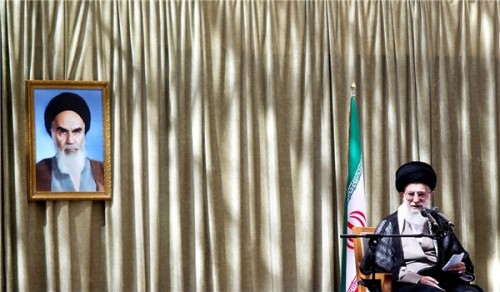LATEST: Head of Assembly of Experts in Hospital After Heart Attack
The Supreme Leader used his speech on the 25th anniversary of Ayatollah Khomeini’s death to denounce the US and the “takfiris” — Muslim heretics — whom it supposedly supports.
Speaking at Khomeini’s shrine, Ayatollah Khamenei told the crowd, “Our external challenge is global arrogance. Let’s be honest, these troubles and challenges are due to American meddling.”
The Supreme Leader said the US could not win through “military invasion” after “their failures in Iraq and Afghanistan”; however, it was trying to undermine the Islamic Republic through propaganda via television, radio, and the Internet.
Part of that effort was beyond Iran with attacks on Tehran’s allies, as Western intelligence services used the deviants from Islam: “Today Takfiri groups are working against Islam and Shi’as in certain regions and carrying out evil acts, but they are not the main enemies. The main enemy is the one who provokes them and provides them with money.”
Even as Iran pursues nuclear talks with the US and the other 5+1 Powers, Khamenei’s verbal attack is unsurprising: he has repeatedly accused Washington of dishonesty and perfidy. That animosity has been stoked by the conflict in Syria, as Iran continues to bolster President Assad against the challenge of an opposition nominally supported by the White House.
Khamenei tied this to the declaration of Iran’s ultimate triumph in the Middle East and Islamic world:
The Islamic Awakening might be suppressed in part of the Islamic world for a while but undoubtedly it would not be uprooted. It would keep growing. Such a concept and understanding seen in countries and the younger Muslim generation in the region is not something which can be easily discarded. Of course, they (“hegemonic powers”) will continue trying and their efforts might seem successful in certain domains for a short period of time, but will not continue in the long run.
The Islamic Republic of Iran has the first say when it comes to policy making in the region; it stands alone against the usurper regime (of Israel), that is supported by the world bullying powers; it does not tolerate the tyrant while defending the oppressed.
More striking in the speech was its lack of balance with the Supreme Leader’s emphasis on the menace, in contrast to attention to the situation inside Iran.
Despite the Supreme Leader’s insistence on scientific and technological progress “13 times more than the world average”, the lashing out at the US is another sign that the regime is feeling the pressure of an economy which is still under pressure from sanctions and years of mismanagement. Indeed, Khamenei appears to be preparing for more hardship by asking Iranians to sacrifice for a “Resistance Economy”, especially if nuclear talks break down.
The speech also is bad news for the Rouhani Government. Khamenei’s focus on subversion by media indicates he will continue to endorse the crackdown on social outlets, as hardliners fight any attempt by President Rouhani to relax controls on the Internet and public behavior.
Head of Assembly of Experts in Hospital After Heart Attack
Ayatollah Mahdavi Kani, the head of the Assembly of Experts, suffered a heart attack on Wednesday after attending the memorial for Ayatollah Khomeini.
Mahdavi Kani’s office denied reports that the 83-year-old cleric is in a coma and said he is recovering.
Mahdavi Kani also heads the conservative Association of Combatant Clergy.
The Assembly of Experts supervises the activities of the Supreme Leader and has the power to elect and replace him.
Iran Makes Play for Turkish Support of “Diplomatic Resolution” in Syria
Iran has launched a public initiative to wean Turkey away from support of Syria’s opposition, with Deputy Foreign Minister Hossein Amir Abdollahian asserting both Tehran and Ankara are determined to back a diplomatic resolution of the conflict.
Abdollahian cited quarterly discussions between Iranian and Turkish officials, “In this round of talks in Ankara we discussed the development of Egypt, Syria and Iraq.”
In September 2012, Iran’s Foreign Ministry pursued a “contact group” with Turkey, Egypt, and Saudi Arabia in support of a 9-point political and military plan, but the effort foundered when the Saudis refused to participate.
President Rouhani visits Ankara on Monday.
(Cross-posted from Syria Daily)

